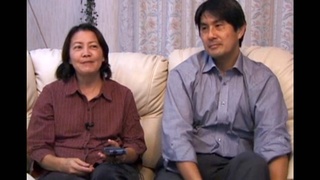Finding Home
Finding Home (2005) is a one-hour documentary about Japanese Americans who have decided to live in Japan rather than America, directed by media artist and Loyola Marymount University professor of film, Art Nomura.
With the support of a 2003-2004 Fulbright Research Grant, Art Nomura conducted research on the contemporary phenomenon of Japanese Americans choosing to live and work in Japan. He conducted videotaped interviews with 29 Japanese Americans out of 52 individuals he contacted during his stay in Japan from early September to early December 2003.
In Finding Home Nomura has featured six Japanese Americans who decided to live in Japan (Enson Inoue, Peter Mizuki, Ann K. Nakamura, Vince Ota and Jane Aiko Yamano). Nomura depicted their reasons for doing so, and their acceptance/treatment by native Japanese.
*Selected interviews which Nomura conducted during his stay in Japan are also available on the Discover Nikkei. (Pam Kaji, Steve Kaji, Bob Kiyoshi Okasaki, Yukio Takeshita, and Wayne Shigeto Yokoyama)
Message from Director, Art Nomura
My first visit to Japan comes near the end of my 57th year. It took me that long to overcome my suspicions about the place. My late father, Takuma ‘Henry’ Nomura was a kibei, a Japanese who was born in America, but raised in Japan. Time and again he told me that Japan was ‘ichiban, number one.’ By the time I was a teenager I had grown so tired of hearing him boast that I’d cut him off by saying, “If you think it’s so great, why don’t you live there?” His silent response spoke volumes.
Years later, the memory of my blunt challenge still haunts me. All things considered, Dad was a good guy, prone to outlandish stories and blessed with a generous nature despite an incredibly difficult upbringing. Perhaps my challenge stemmed from being unconsciously ashamed of his Japanese accent, or, more likely, the attack of the Japanese on Pearl Harbor.
Nakadegawa-bachan, my maternal grandmother, lived with our family for over thirty years. Although we cared for each other, her inflexible attention to form, and what felt like a hypocritical politeness to strangers, always rubbed me the wrong way.
As a child, a brief stint at a Sunday morning Japanese language school, also left a negative impression. As a result I made a point of not talking Japanese to anyone, even though my dad and grandmother spoke it to me throughout my childhood. I grew up not fully understanding Japanese. My ancestral language, behavior, and values seemed a bad fit for the American mainstream I was trying to join.
Together, they represented my image of Japan, so going there was never an attractive idea.
But then something amazing happened. In 2001, my eldest child Christopher, with a freshly minted Ph.D. in Biochemistry in hand, was offered a job in Japan near Tokyo. Four years later, he still loves living there!
Were my own long-held notions of Japan blinding me to what was really there? Supported by a Fulbright Research Grant and a sabbatical from teaching at LMU, I headed to Japan in the late summer of 2003. My goal was to find out what Chris, and other Japanese Americans who have chosen to live in Japan for the long-term, have found so appealing.
Ironically, when asked, Chris didn’t want to be included in my documentary. I think deep down he wanted me to search for answers beyond the experiences of our immediate family.
Fortunately for me, other Japanese Americans surfaced. I managed to interact with about 50 of them. Eventually six were chosen for Finding Home. My heartfelt thanks to them for sharing their stories, and to everyone else who helped me redefine Japan in a more positive and meaningful way.
Art Nomura
Artist’s statement:
I have been a documentary film and video maker for over twenty-five years. One of my earliest works, Refugees from Laos -- A Hill Tribe in West Oakland (1981), a documentary about the relocation of Yu Mien refugees from the Vietnam War, clearly roots my interests in topics involving social upheaval and adjustment. Similarly, many of my succeeding works such as Wok Like a Man (1987), Getting Along (1992), Buckaroo Boy (1996), and my one-hour dramatic pilot for television, Lotusland (1991), explore and illuminate issues of race, identity, and the relationship of the minority to the mainstream.
I am a Professor in the School of Film and Television at Loyola Marymount University in Los Angeles. I am married and have three children. My oldest, Christopher, lived in Japan for five years as a post-doctoral biochemical researcher at the Riken Institute in Saitama. His enthusiasm for Japan was a prime motivator for my first time visit to Japan in 2003 as a Fulbright Research Grantee. During my nearly five months there I shot Finding Home (2006), a one hour documentary about Japanese Americans who have chosen to live in Japan instead of America.
I have lived and traveled internationally extensively. In the winter/spring of 1997, I lived and taught Portuguese graduate students at the Catholic University in Porto, Portugal. In the summer of 1998 I taught at the Rome, Italy, extension of Loyola University Chicago. In the fall of 1999, I taught at the Academy for International Education in Bonn, Germany, as part of Loyola Marymount’s New Europe Study Abroad program. In August 2002, I enjoyed the company and the accompanying dialogue with artists in Edinburgh, Scotland, and London. I enjoy the challenge of living in foreign countries and the attendant opportunities for personal growth and development. My background includes a colorful childhood in mostly African American south central Los Angeles, followed by a stint in Orange County (California) European American suburbia, followed by high school in Latino East Los Angeles.
For further information about Art Nomura and his creative work, please visit his website.
Nomura has contributed footage from video interviews done as part of his 2005 documentary Finding Home to the Discover Nikkei video archives.










